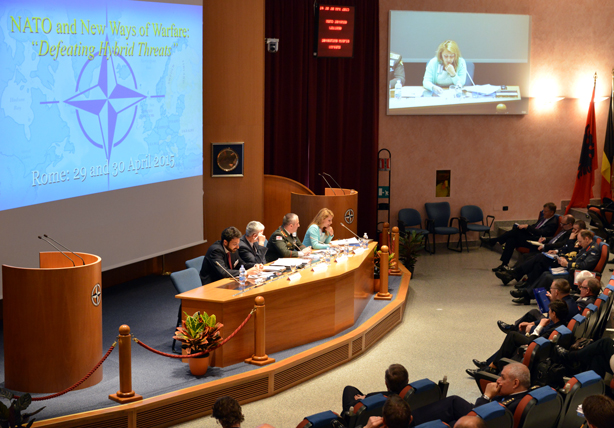The perils of hybrid threats in Central Europe
Some 25 years ago, warfare and international security were understood more or less solely through the lens of military features. The changing nature of threats to security has determined a change in the way security is perceived, encompassing today threats from a variety of sectors such as political, economic, societal, militarily or environmental. Although not new, hybrid threats pose one of the biggest risks in the contemporary security and political environment since they comprise a mixture of means (i.e. technological, financial, diplomatic, legal, economic and military) intended to exploit weaknesses and undermine governments, government agencies and the democratic process hinder the decision making process.
August 21, 2017 -
Agnieszka Pikulicka-Wilczewska
-
Articles and Commentary

Amongst the most relevant threats societies and governments face in the hybrid sphere are information warfare, cyber-attacks, political radicalisation, and support for populist organisations. What makes it more complicated is the fact that the tools employed in hybrid warfare will continuously evolve making them difficult to counter, therefore governments must continuously develop and strengthen instruments designed to counter the different tools used in hybrid warfare.
Central European states face the risk of hybrid threats illustrated mainly through disinformation, propaganda campaigns, cyber threats and other possible subversive actions. Governments are especially focusing on Russia’s attempts to bolster its influence in the region and the connections with political groups as well as the use of economic tools. Pressure exerted by Russian offshoots destabilises the democratic process and erodes the credibility of public institutions, as well as attempting to crumble the image of NATO and the EU in Central European countries.
The lack of governmental cohesion and mechanisms to counter these threats, skepticism towards EU and NATO, and vulnerability of the public create a promising environment for the employment of hybrid warfare tools such as disinformation and propaganda.The recently released Vulnerability Index report by GLOBSEC stresses a relatively high degree of susceptibility to foreign influence, especially to Russian subversive actions in Slovak and Hungarian societies with Czech and Polish societies being more resilient.
Countering hybrid threats in Central Europe
In the process of dealing with hybrid threats and especially information warfare, the framework that should be created must encompass an inclusive range of players, from government departments and government agencies to civil society and citizens as well as actors from the private sector. This partnership will help to build a far-reaching response to the variety of threats posed by hybrid perils that involves tackling them on multiple levels using acomprehensive approach.
Another avenue to engage is by creating new branches of the existing structures that have competencies in dealing with security threats – for instance bolstering a strategic communication department from a governmental structure or creating a newly distinct department that deals with forms of hybrid warfare such as disinformation.
In this regard a good example is represented by the Czech Centre Against Terrorism and Hybrid Threats within the Interior Ministry. Creating similar divisions and national centers in other Central European countries could make a significant difference in countering hybrid threats. At the level of the Slovak government, the creation of an inter-ministerial cell to deal with these issues is under way with the expectation of making an impact as soon as possible.
A very important counter instrument that can be employed is represented by awareness campaigns developed by the local governments that highlight how propaganda works, how citizens can recognise it and what are the counter measures deployed by the state. These campaigns must be implemented in partnership with civil society actors (firstly, they need to be informed and trained) that can act as a bridge to citizens and echo the campaign to a greater outreach.
The support from the civil society actors is paramount in tackling different forms of hybrid warfare such as propaganda and disinformation that aim at destabilising the state institutions and deteriorate the levels of public trust in them. The private sector players must also be a part of this approach. Public research institutions play as well an important role in the equation, as public research on topics related to hybrid warfare can contribute to informing society and extending the knowledge in this area.
Awareness campaigns aimed at enhancing the understanding of NATO and the actions undertaken by the Alliance can have an impact on citizens and shift the balance in favor of its more positive image.A good example in this sense is the NATO Force Integration Unit from Slovakia, which focuses among its activities on explaining the role of NATO and conveying a fair assessment of NATO amongst the population.
Strengthening the NATO–EU cooperation in the area of hybrid threats is crucial in creating a common framework to address these threats. Forging regional cooperation and enhancing capacity building in tackling information warfare is essential among Central European Countries for a concerted response. In addition, cooperation in adjacent fields such as education and training exercises on how to manage hybrid threats can be a significant game changer. The ultimate aim should be to synchronize the response, making it much more effective and powerful.
Mihai Chihaia is an Expert with the Romanian think tank Strategikon and is currently undertaking his PhD in EU Foreign Policy at University of Iasi, Romania. He has previously been an exchange research fellow at Tel Aviv University and worked as assistant to the European Commission Representative in the Political and Security Committee of the European Union.

































